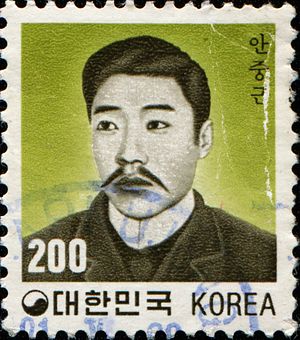A memorial hall commemorating anti-Japanese activist Ahn Jung-geun was opened in Harbin, China, bringing praise from South Korea but criticism from Japan.
Ahn is known for assassinating Hirobumi Ito, Japan’s first prime minister. The hall, the first in China to honor the South Korean national hero, was built inside the VIP facility of Harbin Railway Station, the site where the assassination occurred.
“People have cherished the memory of Ahn for the past century. Today we erect a memorial to him and call on peace loving people around the world to unite, resist invasions and oppose war,” said Sun Yao, vice governor of Heilongjiang, according to Xinhua.
The South Korean foreign ministry praised the museum, saying that it would “set the path for genuine peace and co-operation based on correct historical awareness.”
The memorial was criticized by the government of Japan, where Hirobumi Ito is regarded as one of the founding fathers of the country. Chief Cabinet Secretary and government spokesperson, Yoshihide Suga described the opening as “regrettable” during a regular press conference.
“The Japanese opinion of Ahn Jung-geun is that he is a terrorist who was sentenced to death for murdering Ito Hirobumi, our first prime minister,” he stated.
Saenuri Party Secretary General Hong Moon-jong fired back at Suga during a cabinet meeting on Tuesday arguing, “If Ahn Jung-guen was a terrorist, then Japan was a terrorist state for having mercilessly invaded and plundered countries around it.”
Ahn Jung-geun is regarded as a national hero in South Korea for resisting Japan’s influence over the peninsula during the 19th century. Schoolchildren in the country learn about him in textbooks or through memorials.
Last June, South Korean president Park Geun-hye proposed the monument during a Korea-China summit in Beijing, leading to reports in the Japanese media that South Korea and China were collaborating against the Shinzo Abe administration in Tokyo.
Japan’s relations with South Korea and China have soured since the Abe administration entered government in late 2012. The Japanese prime minister’s recent visit to the controversial Yasukuni Shrine was met with protests from its neighbors and even a statement from the U.S. embassy that said that it was “disappointed.”
The Ahn Jung-geun Museum isn’t the first memorial to be criticized by members of the Japanese government. Last week a group of Japanese politicians visited Glendale, California to protest a statue that honors comfort women throughout Asia. The delegation held up a sign that read, “Children need heart-warming monuments.”
































